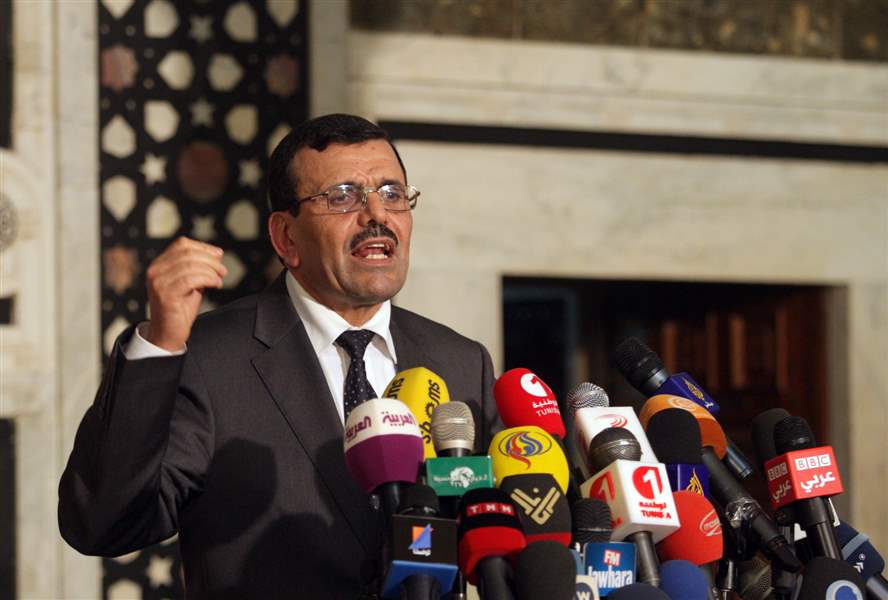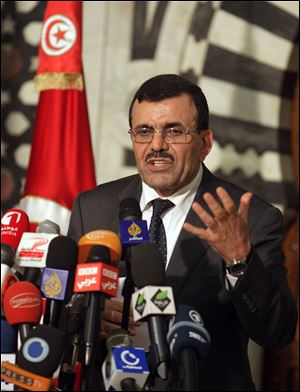
Tunisian PM defies demands that he step down, promises elections by Dec. 17
7/29/2013
Tunisian Prime Minister Ali Larayedh addresses the media during a press conference held in Tunis, Tunisia, Monday, July 29, 2013. Tunisia's prime minister responded to mounting opposition demands to dissolve the government with a defiant speech Monday, promising to complete the country's democratic transition with a new constitution by August and elections in December. (AP Photo/Hassene Dridi)
ASSOCIATED PRESS
TUNIS, Tunisia — In a defiant speech, Tunisia’s prime minister rejected opposition demands that his government step down and promised today to complete the country’s democratic transition with a new constitution by August and elections in December.

Tunisian Prime Minister Ali Larayedh addresses the media during a press conference today in Tunis, Tunisia.
The assassination of two opposition legislators over the last six months has plunged Tunisia — the birthplace of the Arab Spring — into a crisis with anti-government protests, the resignation of a Cabinet minister, and a walkout by dozens of lawmakers.
The standoff was given extra urgency by a bloody ambush that took place today in a mountainous region near the Algerian border known as a hideout for Islamic militants that left at least 9 soldiers dead, according to a local hospital.
Prime Minister Ali Larayedh’s fiery speech, in which he called those wanting to dissolve the government “anarchists” and “opportunists,” is unlikely to appease an angry opposition that says the Islamist-led government has failed to carry out the political transition promised after the overthrow of Tunisia’s dictator in January 2011.
With many of the countries that saw pro-democracy uprisings during the Arab Spring heading toward chaos or renewed authoritarianism, Tunisia was considered the best hope for democracy in the region — until its current crisis.
On Thursday, left-wing Tunisian politician Mohammed Brahmi was assassinated in Tunis, shot 14 times outside his home in front of his family. That followed the killing of another left-wing opposition legislator, Chokri Belaid, in February.
On Sunday night, thousands of people demonstrated in front of the elected assembly charged with writing the country’s new constitution and demanded that it be dissolved along with the government. Dozens of opposition lawmakers have suspended their participation in the assembly, and Education Minister Salem Labiadh submitted his resignation today.
Even more serious for the government, the governing coalition appears to be breaking apart. Mohammed Bennour, spokesman for the left-of-center Ettakatol (Forum) Party, said his group wants to withdraw from the coalition and dissolve the government. That would leave the moderate Islamist Ennahda Party that dominates the coalition even more isolated.
But Larayedh struck a defiant note in his speech, maintaining that the “dissolution of the assembly and the government would not help the situation or gain us time.”
In his televised speech, during which he often banged on a podium, he presented a road map for completing the long drawn out democratic transition with a new constitution by the end of August and the passage of the needed election laws by Oct. 23 — the anniversary of the date in 2011 that brought the Ennahda Party to power.
He said an election for a new legislative body would be held on Dec. 17, the third anniversary of the self-immolation of itinerant fruit seller Mohammed Bouazizi that sparked the uprising that overthrow dictator Zine El Abidine Ben Ali a month later.
The constitutional assembly was supposed to write a constitution and hold new elections within a year. Instead the transition has dragged on for nearly two years as the country has been beset by social unrest, a faltering economy and terrorist attacks.
Larayedh promised to hold “free and fair elections under international supervision” and said the government is open to any dialogue and proposals to complete the transition. He said he is even open to a Cabinet reshuffle.
“Dialogue should not be in the streets or through violence but at the table and about strategies and plans,” he said.
Larayedh maintained, however, that those calling for dissolving the assembly and government were small groups, and he threatened to mobilize government supporters against them to preserve public order.
On Sunday night, thousands of government supporters did come out to confront those protesting in front of the assembly and police had to separate them.
Interior Ministry spokesman Mohammed Ali Aroui said today that security forces committed some abuses while dispersing protesters with tear gas early today. But he defended their efforts to avoid what he called a “blood bath” between the rival demonstrations.
There also have been anti-government protests in several cities in the interior of Tunisia since Thursday’s assassination.